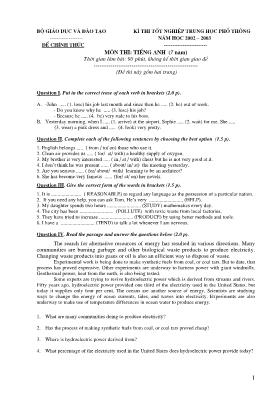Đề thi Tốt nghiệp THPT Quốc gia môn Tiếng Anh (Hệ 7 năm) - Năm học 2002-2003
Bạn đang xem tài liệu "Đề thi Tốt nghiệp THPT Quốc gia môn Tiếng Anh (Hệ 7 năm) - Năm học 2002-2003", để tải tài liệu gốc về máy bạn click vào nút DOWNLOAD ở trên

1 Bộ giáo dục và đào tạo Kì thi tốt nghiệp trung học phổ thông ------------------- năm học 2002 – 2003 Đề chính thức ------------------------- Môn thi: tiếng anh (7 năm) Thời gian làm bài: 90 phút, không kể thời gian giao đề ------------------------------------------------------- (Đề thi này gồm hai trang) Question I. Put in the correct tense of each verb in brackets (2.0 p). A. -John ..... (1. lose) his job last month and since then he ..... (2. be) out of work. - Do you know why he ..... (3. lose) his job? - Because he ..... (4. be) very rude to his boss. B. Yesterday morning, when I ..... (1. arrive) at the airport, Sophie ..... (2. wait) for me. She ..... (3. wear) a pink dress and ..... (4. look) very pretty. Question II. Complete each of the following sentences by choosing the best option (1.5 p). 1. English belongs ..... ( from / to/ on) those who use it. 2. Clean air provides us ..... ( for/ at/ with) a healthy supply of oxygen. 3. My brother is very interested ..... ( in / at / with) chess but he is not very good at it. 4. I don’t think he was present ...... ( about/ in/ at) the meeting yesterday. 5. Are you serious ...... ( for/ about/ with) learning to be an architect? 6. She has become very famous ...... (for/ at/ on) her novels. Question III. Give the correct form of the words in brackets (1.5 p). 1. It is ....................... ( REASONABLE) to regard any language as the possession of a particular nation. 2. If you need any help, you can ask Tom. He’s very .......................... (HELP). 3. My daughter spends two hours .......................... (STUDY) mathematics every day. 4. The city has been .......................... (POLLUTE) with toxic waste from local factories. 5. They have tried to increase .......................... (PRODUCE) by using better methods and tools. 6. I have a .......................... (TEND) to talk a lot whenever I am nervous. Question IV. Read the passage and answer the questions below (2.0 p). The search for alternative resources of energy has resulted in various directions. Many communities are burning garbage and other biological waste products to produce electricity. Changing waste products into gases or oil is also an efficient way to dispose of waste. Experimental work is being done to make synthetic fuels from coal, or coal tars. But to date, that process has proved expensive. Other experiments are underway to harness power with giant windmills. Geothermal power, heat from the earth, is also being tested. Some experts are trying to revive hydroelectric power which is derived from streams and rivers. Fifty years ago, hydroelectric power provided one third of the electricity used in the United States, but today it supplies only four per cent. The oceans are another source of energy. Scientists are studying ways to change the energy of ocean currents, tides, and waves into electricity. Experiments are also underway to make use of temperature differences in ocean water to produce energy. 1. What are many communities doing to produce electricity? 2. Has the process of making synthetic fuels from coal, or coal tars proved cheap? 3. Where is hydroelectric power derived from? 4. What percentage of the electricity used in the United States does hydroelectric power provide today? 2 Question V. Fill in each space with a suitable word (1.0p). British and American English have a lot of words which look the same but have different meanings. Nobody ever gets ....(.1)...trouble if they make a mistake, although you may get a strange look if you ask for the wrong clothes. There are some American English words that the British don’t use at .... (2).... . However, most of the .... (3).... between British and American English are small. You can usually understand what words .....(4)..... from the context. Question VI. Finish each of the following sentences in such a way that it is as similar as possible in meaning to the original sentence (2.0 p). 1. "Please sit down,” the teacher said to me. The teacher asked me .................................... . 2. Let’s go camping tomorrow. Why don’t ................................................ ? 3. I fell asleep because the film was boring. The film was so ................................................. . 4. “ What are you doing?”, she asked me. She wondered ................................................................... 5. Cars cause pollution but people still want them. Although............................................................................. 6. Please don’t play your music so loudly. Would you mind..................................... ......................? 7. I don’t find it difficult to get up early in the morning. I am used .................................................................................. 8. Larry didn’t buy the shirt because she didn’t have enough money. If Larry ............................................................................................... ----------THE END ---------- Họ và tên thí sinh: ...................................................; Số báo danh:.................................... Chữ kí của giám thị 1: ......................................., giám thị 2: .............................................
Tài liệu đính kèm:
 de_thi_tot_nghiep_thpt_quoc_gia_mon_tieng_anh_he_7_nam_nam_h.pdf
de_thi_tot_nghiep_thpt_quoc_gia_mon_tieng_anh_he_7_nam_nam_h.pdf Anh7_2003_HD.pdf
Anh7_2003_HD.pdf





